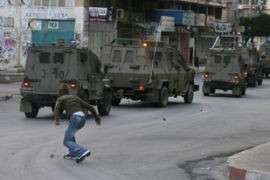Israel ends West Bank incursion
About 40 Palestinians injured by rubber bullets in raid on “terrorist infrastructure”.

Security crackdown
Dozens of Israeli army jeeps entered the town on Thursday, where the Palestinian Authority has recently deployed hundreds of security force personnel as part of a security crackdown.
Although it supports the Palestinian security plan, Israel has neverthless said it reserves the right to launch its own operations inside Palestinian towns and villages.
| “This was one of the most aggressive raids” Massoud Kalboneh, Nablus resident |
As Israeli troops pulled out of Nablus on Saturday, tear gas and concussion grenade canisters littered the streets of the Old City, where dozens of shops had been forced open using explosives or cutting gear.
Food supplies dwindled as the operation continued because shopkeepers were unable able to get into the city to replenish stocks. The Palestinian Red Crescent had to distribute food to people confined by the curfew.
Massoud Kalboneh, a 35-year-old construction worker, told the Associated Press news agency that soldiers had roughed up his five-year-old nephew thinking he was trying to escape after he dived under a bed.
“This was one of the most aggressive raids” Nablus has known, he said.
After the raid ended, Jamal Muheisin, the city’s governor, was jeered by residents of the Old City angered by the authorities failure to prevent the incursion despite mounting its own operations against Palestinian armed groups.
‘Israel in control’
Ohood Yaish, a 52-year old social worker who was been trapped at home by the curfew, said she was surprised by the Israeli raid after the increased deployment of Palestinian security forces in Nablus.
“Israel is the one in control, it is the one that decides and it has decided that we should stay at home all this time,” she said.
Salam Fayyad, the Palestinian prime minister, said he had called off a trip to Egypt to attend to the situation in Nablus.
“The current Israeli operation aims to heat up the atmosphere before Bush’s visit,” he told al-Najah Radio. “They are trying to sabotage the Palestinian Authority’s successes in the city.”
Bush will arrive in Israel on January 9 before meeting Mahmoud Abbas, the Palestinian president, and Fayyd in Ramallah the following day.